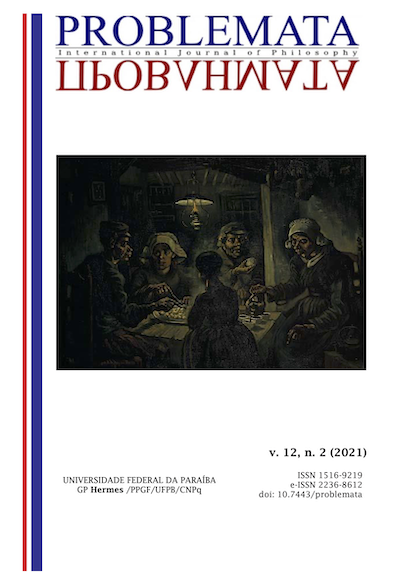FOR A ROOTED PHILOSOPHY:
CONSIDERATIONS FROM SIMONE DE BEAUVOIR
DOI:
https://doi.org/10.7443/problemata.v12i2.59896Keywords:
Simone de Beauvoir, Ambiguity, Ontology, Materialism, PhilosophyAbstract
The purpose of this research is to propose some considerations about Simone de Beauvoir's position in the face of philosophical practice, a theme already worked by his commentators throughout the reception of his work, however, mobilizing here specifically the bases of the materialistic and ambiguous ontological structure centered on the embodied presence of subjectivity. It is, above all, to show how the characteristics of this specific way by which Simone de Beauvoir understands the human becoming as marked by an ambiguous bound to the thickness of situation, can allow us to think possible developments for this Beauvoir’s positioning as a refusal to be read as realizing a traditional philosophical activity.
Downloads
References
BAUER, Nancy. Simone de Beauvoir, philosophy and feminism. New York: Columbia University Press, 2001
BEAUVOIR, Simone de. “La pensée de Droite, aujourd’hui” In: BEAUVOIR, Simone de. Privilèges. Paris: Gallimard, 1955, pp. 91-200.
BEAUVOIR, Simone de. “L’existentialisme et la sagesse des nations”. In: BEAVOIR, Simone de. L’existentialisme et la sagesse des nations. Paris: Gallimard, 2008 a, pp. 11-38.
BEAUVOIR, Simone de. “Littérature et métaphysique”. In: BEAVOIR, Simone de. L’existentialisme et la sagesse des nations. Paris: Gallimard, 2008 b, pp. 71-84.
BEAUVOIR, Simone de. Pour une morale de l'ambiguité suivi de Pyrrhus et Cinéas. Paris: Gallimard, 2013.
BEAUVOIR, Simone de. La force d l'âge. Paris: Gallimard, 2015.
BEAUVOIR, Simone de. Le deuxième sexe. Vol. I. Paris: Gallimard, 2016a.
BEAUVOIR, Simone de. Le deuxième sexe. Vol. II. Paris: Gallimard, 2016b.
BEAUVOIR, Simone de. La force des choses. Vol. I. Paris: Gallimard, 2017.
HEGEL, George W. F. Fenomenologia do espírito. Petrópolis: Editora Vozes, 2016.
HOLVECK, Eleanore. Simone de Beauvoir's philosophy of lived experience. Oxford: Rowman and Littlefield Publishers, 2002.
KAIL, Michel. "Pour un matérialisme anti-naturaliste : la leçon de Simone de Beauvoir''. In. Nouvelles Questions Féministes, Vol. 20, No. 4, LE NATURALISME DEPUIS BEAUVOIR(1999 NOVEMBRE), pp. 49-74.
KOSIK, Karel. La dialeticque du concret. Paris: Maspero, 1978.
KRUKS, Sonia. “Simone de Beauvoir and the Marxism question”. In. HENGEHOLD, Laura (Ed.). A companion to Simone de Beauvoir. London: Blackwell Publishers, 2017.
LÖWY, Michel. A teoria da revolução no jovem Marx. Petrópolis: Editora Vozes, 2002.
MARX, Karl. A ideologia alemã. São Paulo: Boitempo Editorial, 2017.
SIMONS, Margaret A. Beauvoir and The Second Sex: Feminism, race and the origins of existentialism. Oxford: Rowman and Littlefield Publishers, 1999.
SIMONS, Margaret A. “Beauvoir, philosophy and Autobiography”. In. HENGEHOLD, Laura (Ed.). A companion to Simone de Beauvoir. London: Blackwell Publishers, 2017.
SINNERBRINK, Robert. Hegelianismo. Petrópolis: Editora Vozes, 2007.
VINTGES, Karen. Philosophy as a passion: The thinking of Simone de Beauvoir. Bloomington: Indiana University Press, 1996.
Downloads
Published
Issue
Section
License
Copyright (c) 2021 Nathan Menezes Amarante Teixeira

This work is licensed under a Creative Commons Attribution 4.0 International License.
Authors who publish with this journal agree to the following terms:
- Authors retain copyright and grant the journal right of first publication with the work simultaneously licensed under a Creative Commons Attribution License that allows others to share the work with an acknowledgement of the work's authorship and initial publication in this journal.
- Authors are able to enter into separate, additional contractual arrangements for the non-exclusive distribution of the journal's published version of the work (e.g., post it to an institutional repository or publish it in a book), with an acknowledgement of its initial publication in this journal.
-
- Authors are permitted and encouraged to post their work online (e.g., in institutional repositories or on their website) prior to and during the submission process, as it can lead to productive exchanges, as well as earlier and greater citation of published work (See The Effect of Open Access).





